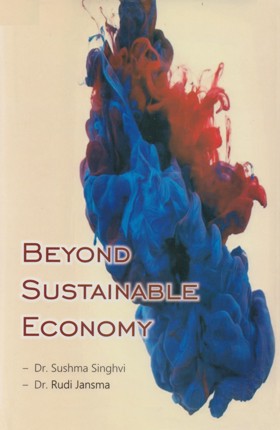Generally religion is understood as merely a ritualistic thing. People do rituals as a part of their religion. Ritual is a convention. The tradition exists within the family and within the society. In an ideal mental state, duty takes the form of habit and ethics changes into psychology. The body and mind are immersed in these aspects. Habit and psychology are the clue to human behavior. Human behavior associated throughout one's life. Ethics is an important aspect of religion. In the ethics, there is no difference in man's duty for himself as well as to the society.
Parigraha is the cause of all problems. It takes away peace, makes man a devil and encourages doing all sorts of wrong things. It is the root cause in terms of finance and creates all types of imbalances in society. The 'special economic zone' idea has created lots of trouble in many countries and especially in India. By definition, possessiveness means taking interest in worldly things and physical comfort. The opposite of this is non-possessiveness. A person will establish his right of 'mineness' everywhere. A person has a desire of ownership. This possession factor is the strongest one, comparable to the effect of any astrological planet.
The karma of delusion, built up as a result of wrong views adhered to and practiced in this or in previous lives, is responsible for the tendency of a person now giving wrong information and his or her acting in possessive way. One can have so much possessions which fulfils his basic needs as an individual. This very fact leads one to think of possessiveness. Possession of material things has unlimited anxiety in its wake, surrender to immoral activities, acting unjustly and taking shelter in falsehood. The loss of material things will result in pain and bad thoughts, not in peace. There are eighteen types of sins described in Jain philosophy, possession being number five in the list.
Possession or ownership increases a person's passion and wishes. Possession means that one denies and deprives others' right to possess what other they require. The best advice is that a person should leave his sense of 'mineness'. Possession may instigate a person to theft, killing, untruthful conversation, it makes him cruel and inspires him to do all sorts of bad, i.e. immoral things. Aristotle (384322 BCE), the most intellectual pupil of Plato in ancient Greece, said at one place that money should only de acquired in order to provide the means for the exercise of one's capabilities and not be wasted for non-monetary and non-acquisitive goals.
The Latest truly enlightened Jain teacher, Vardhaman Mahavira (599527 BCE), was a realist. He realized the differences between a materialistic life and a spiritual life. Materialistic life will give temporary happiness, while spiritual life will give lasting happiness. A materialistic life will ultimately result into unhappiness. It will be a causal of pain and suffering. A spiritual life will lift the individual into a state beyond the duality of alternating happy and non-satisfactory realities: a state called 'bliss' of abiding in Truth without doubts and downfalls (Ed.)
People should control their desires, especially passionate desires, which always are followed by frustration and psychological, mental or physical disease, even in future lives. The result of desire control will be as follows. [1]
- There is no poverty, but at the same time no luxurious life.
- Money is the instrument for what is needed. Money is for man man not for money.
- One will fulfill one's need with a view not to harm others.
- One naturally decides to limit one's income, the seed of greed and selfishness.
- One realizes that in the world money is useful, but shows complete indifference to excess money.
- One should accept that the virtue of money is to give satisfaction in the world in which we live, and therefore:
- One should develop a tendency to use money for good purpose.
Lord Mahavira defined the 'greed' in the Uttaradhyāyana Sūtra as follows: "Where there is inner desire for material gain and possession of worldly objects of enjoyment, there is greed."[2] Therefore lord Mahavira taught to apply discrimination of what is really needed. Lord Mahavira taught that something or someone being harmful to our body, mind and feelings should be avoided. Lord Mahavira told to control imaginary need. He gave a golden equation: Limit of money = peace and happiness [Note: Mahavir ka Arthaśastra, p. 25]. When one follows simplicity faithfully, material abundance will loose both its spirit and attraction.
Constant change is a law of nature. The new or young becomes old and the old becomes renewed or young again. Consumption is necessary to exist in this world. Corruption at all levels is the result of consumerism what can be defined as excess consumption. The stronghold of religion has eroded through time. Religion is recognized by simplicity, contentment and self-control. But even religion has become a prey to an attitude of consumerism.
Our ethics is to preserve the environment. The ecological balance is a prime issue of today's world. Two types of people are cruel to our environmental assets: 1) Well to do people due to their greed; 2) Penniless people due to their need. This cruelty has become a burning issue. Ichchhaparimana limited desire, is the only human solution for non-possessiveness. The voluntary control of wishes is the only remedy: one could call it voluntary socialism.
The best thing about aparigraha or non-possessiveness is that it is realistic, practical, and that it is a rational principle. Aparigraha or non-possessiveness has a solid foundation in our social system. Lord Mahavira was great social philosopher.
Bibliography
Mahapragya Acarya, Mahavir ka Arthsastra, Adarsh Sahitya Sangh Prakashana, 1994
Dhiraj Muni, Uttarayadhayana Sutra (in Gujarati,) Vitrag Prakashan, Mumbai, 2003.
 Dr. Kantilal R. Shah
Dr. Kantilal R. Shah
 Dr. Rudi Jansma
Dr. Rudi Jansma
